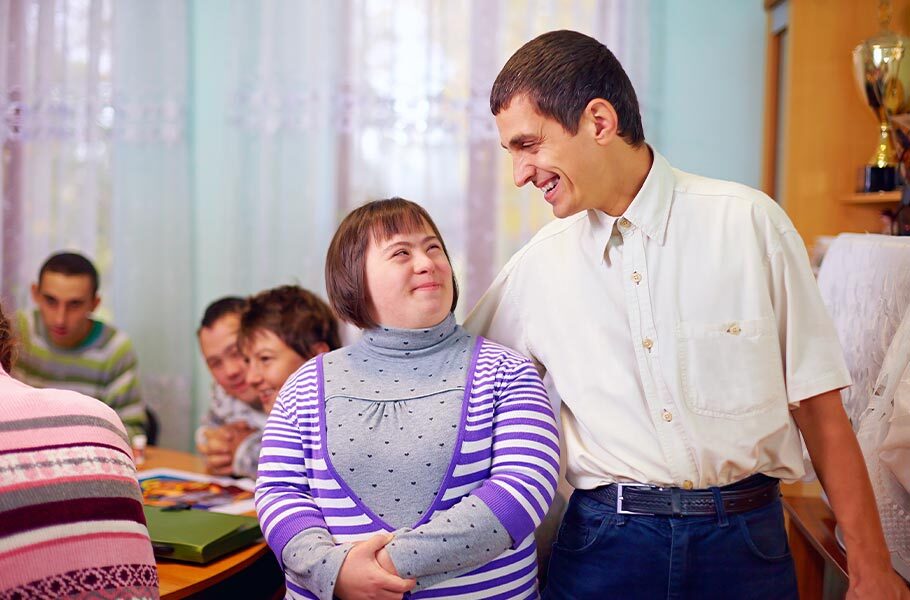Child custody cases involving special needs children tend to be more complex and involve more elements than other custody cases. Your special needs child may not fully understand what is happening or require special accommodations, potentially resulting in you seeking a more flexible order from the court.
Physical and legal custody of a special needs child can quickly evolve into an intricate ordeal, especially regarding visitation, child support payments, child custody, and healthcare. Let the family law attorneys at Melone Hatley, P.C. help you untangle the complexity surrounding Virginia child custody cases, especially when your child has special needs.
You Need to Think About Your Child Throughout the Divorce Process

The standard in all custody and visitation matters is the best interests of the child. When you are still in the early stages of separation, you should prepare to answer essential questions about your special needs child and make a plan before heading into a divorce.
These questions include the following:
- What is your child’s medical condition?
- Will your child one day be able to support themselves as an adult?
- Can they make frequent transitions, or do they need a rigid schedule?
- Is anyone besides you and your spouse involved in the child’s care?
- Do your child’s unique needs require any out-of-pocket expenses?
- Does your child need home modifications?
- What medical care and medication does your child need?
You should gather documentation to back up the answers to these questions. Such documentation could be anything from medical records to letters from high school teachers, photographs, and beyond. Any evidence you can gather will help create a parenting plan and establish child support needs for the future.
Schedule your free meeting with our team today to see if our Lawyers can help you.
What Is the Court’s Preference for Child Custody in a Special Needs Case?
The courts start with a presumption that both parents have equal rights to the child. They generally favor whatever is in the best interests of the child. If possible, the court will prefer joint legal custody, a co-parenting custody arrangement where even if one parent is the primary caregiver, both parents share in decision-making.
Dividing Custody Rights of Parents of a Special Needs Child

Parents’ custody rights require particular attention in special needs cases because most special needs children require more care than those without special needs. For the most part, minimizing disruptions in the child’s life is ideal, particularly for a disabled child with issues such as severe autism, where a rigid schedule is beneficial. In such cases, disrupting your child’s schedule can create a mental health impairment that can harm your child’s well-being.
Understanding the different types of custody in Virginia is essential. These include sole and joint custody as well as physical and legal custody.
Legal custody refers to the parent who makes decisions for their child, such as where they go to school, their primary doctor, what after-school clubs and activities they attend, and all the day-to-day decisions of raising them. Regarding legal custody, the courts prefer joint legal custody, or co-parenting, unless the grounds for divorce involve one parent being a danger to the child or unfit to render mature decisions.
In some cases, parents may disagree on testing, accommodations, or medical treatment for a special needs child. In those cases, the court may grant one parent primary decision-making authority over those decisions. The court will have to determine which parent is acting in the child’s best interests and will often need to hear from an expert to make a proper determination.
On the other hand, physical custody refers to where the child lives most of the time and which parent has the most physical parenting time. Divorces are more likely to involve primary physical custody, with one parent’s home being the primary residence and the non-custodial parent having scheduled visitation rights. However, even in shared physical custody arrangements, the child does not necessarily split time 50/50 between parents. A shared custody arrangement is defined as one where the non-custodial parent has 90 or more overnight visitations each year. In such cases, the parent that has the child the majority of the time is considered the custodial parent.
Click to contact our family lawyers today
What Happens to Child Support After the Child Turns 18?
Virginia law allows for continued child support payments. These apply if your child has physical medical needs or mental health limitations that render them unable to support themselves, if they still live with the parent seeking financial support, or if they cannot meet previous clauses, agreements, and orders.
Specifically, the court can order continued support payments for children over 18 who are full-time high school students, who are not self-supporting, and who are still living with the parent requesting support. These can continue until the child graduates from high school. Alternatively, the courts can order continued support for children over 18 who are severely and permanently disabled, whose disability existed before they turned 18, who cannot live independently and support themselves, and who currently live with the parent seeking support.
Schedule a call with one of our client services coordinators today
Setting Up an ABLE Account or Special Needs Trust

Virginia family law states that courts can order child support payments to be made to an ABLE account or special needs trust. Your Virginia family law attorney can help you set these accounts up while advising you on the best option for your disabled child. The most significant benefits of these two types of accounts are that you can ensure that the funds are used for the child’s special needs and that they do not affect the child’s eligibility for government benefits.
Many parents of children with special needs may receive Social Security benefits such as Supplemental Security Income, or SSI. SSI helps disabled people with limited income and provides for basic needs such as food, clothing, and housing. Custodial parents who receive SSI benefits because of a special needs child may not have their child support payments reduced because of their SSI benefits.
Additionally, Medicaid waivers can be essential for children with special needs. These waivers allow for reduced costs, expanded coverage, and improved care for those who receive the waivers. They allow the state to provide services such as in-home care that otherwise may not be covered by Medicaid.
Trusts can be a way of protecting these critical benefits for the recipients. You can create a special needs trust or ABLE account to provide for your child without risking their eligibility for government benefits.
Special Needs Trust
Special needs trusts address the unique special needs of a child and allocate any child support payments or funds specifically to address those needs. Funds in these trusts can also be paid directly to the child to meet their living expenses. Administering the funds this way allows the child to receive government benefits like Social Security disability or Medicaid for which they might otherwise be deemed ineligible. The right family law firm can give you more information on these trusts and help you set one up for your child.
ABLE Accounts
ABLE special needs savings trusts are a special type of tax-advantaged savings account. They are available for those who become disabled before age 26. Funds held in an ABLE account may be used for specific qualifying expenses tax-free. These accounts, like special needs trusts, do not place the child at risk of losing eligibility for government benefits like Social Security and Medicaid.
Need Help With Your Special Needs Child Custody Case?

The attorneys at Melone Hatley are knowledgeable regarding child custody laws in Virginia, South Carolina and Florida. We have handled many child custody cases for special needs children. We understand how difficult these cases can be and are prepared to navigate the intricacies with you.
For issues of co-parenting, childcare, visitation schedules for family members, government benefits, legal guardians, medical care providers, and beyond, we can help. We know how to work out agreements, defend your rights as a parent, and protect the needs of the child the entire way. We are ready to provide the legal advice and family law representation you need and to stand by your side the whole time.
Prepare to Take Back Custody of Your Special Needs Child
From Fairfax to Virginia Beach, the law offices of Melone Hatley have represented clients at all levels and divorces of all types. We are versed in family law, from child support and child custody to spousal support and property division. We are proud of the trust we build with our clients and are prepared to represent your rights.
Parenting a child with special needs is a full-time job, and the last thing you need is for the stress of divorce to impact your child’s well-being. Let us provide the sound advice you require and be the guiding hand to help you finalize your divorce while keeping your child’s interests first and foremost. Call us at 800-479-8124 or use our online contact form to speak with a member of our client service team today.
Schedule a call with one of our client services coordinators today.





